Stephen Dyer: Ohio High School Voucher Data: Longer You Take a Voucher, Worse You Do
Stephen Dyer takes a deep dive into data about students who use vouchers and how it affects them academically. Dyer starts off with a puzzle:
One thing you’d expect to hear a lot from voucher proponents is that students taking private school tuition subsidies do better the longer they’re in the private schools taxpayers are paying.
I mean, assuming these “choices” are so vastly superior to “failing” public schools, right?
Yet you never hear that argument. Now I know why: according to state test data, the longer students take vouchers, the worse they do on state tests — in some cases a lot worse. Especially in high school.
And he some charts and graphs to help make his point.
Here is how students perform on state High School proficiency states, depending on how long they’ve been taking vouchers. You can see pretty clearly that especially in English and Math, students do markedly worse if they’ve been taking vouchers for 3 plus years than they do if they’ve only been taking it for a year.

This provides some pretty compelling evidence that students taking vouchers are better prepared by public schools, but once they enter the private system, that success wanes. Only in Social Studies is there an increase, but it’s only a 0.9% increase. Math drops by nearly 1/4. Overall, there’s, on average, a 12.1% drop in proficiency rates the longer a high school student takes a voucher.
He also considers the gap between Black and White students, before running some more data and concluding:
- Generally, Voucher students do worse on state tests the longer they take vouchers.
- The Black-White achievement gap is much greater among voucher students than public school students.
- Private Schools that accept Vouchers take a Whiter population of students than the districts from when the students come.
Some voucher supporters argue strictly on the pure value of choice, essentially arguing that it doesn’t matter how good the choices are. What Dyer finds here is that the choices aren’t all that great.